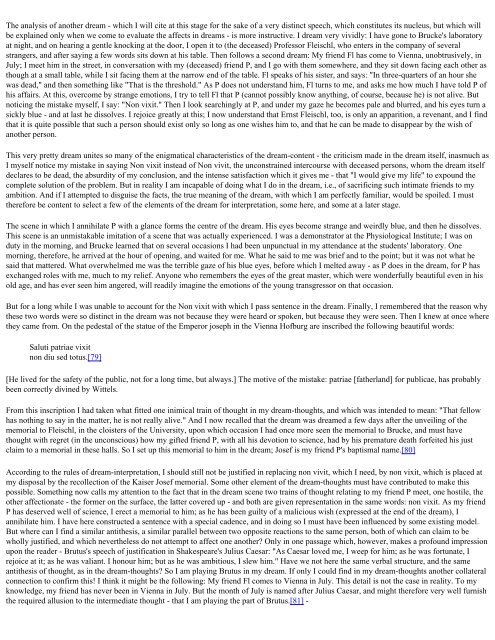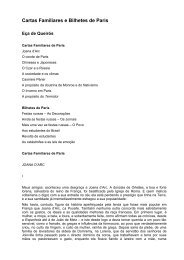The Interpretation of Dreams Sigmund Freud (1900)
The Interpretation of Dreams Sigmund Freud (1900)
The Interpretation of Dreams Sigmund Freud (1900)
Create successful ePaper yourself
Turn your PDF publications into a flip-book with our unique Google optimized e-Paper software.
<strong>The</strong> analysis <strong>of</strong> another dream - which I will cite at this stage for the sake <strong>of</strong> a very distinct speech, which constitutes its nucleus, but which will<br />
be explained only when we come to evaluate the affects in dreams - is more instructive. I dream very vividly: I have gone to Brucke's laboratory<br />
at night, and on hearing a gentle knocking at the door, I open it to (the deceased) Pr<strong>of</strong>essor Fleischl, who enters in the company <strong>of</strong> several<br />
strangers, and after saying a few words sits down at his table. <strong>The</strong>n follows a second dream: My friend Fl has come to Vienna, unobtrusively, in<br />
July; I meet him in the street, in conversation with my (deceased) friend P, and I go with them somewhere, and they sit down facing each other as<br />
though at a small table, while I sit facing them at the narrow end <strong>of</strong> the table. Fl speaks <strong>of</strong> his sister, and says: "In three-quarters <strong>of</strong> an hour she<br />
was dead," and then something like "That is the threshold." As P does not understand him, Fl turns to me, and asks me how much I have told P <strong>of</strong><br />
his affairs. At this, overcome by strange emotions, I try to tell Fl that P (cannot possibly know anything, <strong>of</strong> course, because he) is not alive. But<br />
noticing the mistake myself, I say: "Non vixit." <strong>The</strong>n I look searchingly at P, and under my gaze he becomes pale and blurred, and his eyes turn a<br />
sickly blue - and at last he dissolves. I rejoice greatly at this; I now understand that Ernst Fleischl, too, is only an apparition, a revenant, and I find<br />
that it is quite possible that such a person should exist only so long as one wishes him to, and that he can be made to disappear by the wish <strong>of</strong><br />
another person.<br />
This very pretty dream unites so many <strong>of</strong> the enigmatical characteristics <strong>of</strong> the dream-content - the criticism made in the dream itself, inasmuch as<br />
I myself notice my mistake in saying Non vixit instead <strong>of</strong> Non vivit, the unconstrained intercourse with deceased persons, whom the dream itself<br />
declares to be dead, the absurdity <strong>of</strong> my conclusion, and the intense satisfaction which it gives me - that "I would give my life" to expound the<br />
complete solution <strong>of</strong> the problem. But in reality I am incapable <strong>of</strong> doing what I do in the dream, i.e., <strong>of</strong> sacrificing such intimate friends to my<br />
ambition. And if I attempted to disguise the facts, the true meaning <strong>of</strong> the dream, with which I am perfectly familiar, would be spoiled. I must<br />
therefore be content to select a few <strong>of</strong> the elements <strong>of</strong> the dream for interpretation, some here, and some at a later stage.<br />
<strong>The</strong> scene in which I annihilate P with a glance forms the centre <strong>of</strong> the dream. His eyes become strange and weirdly blue, and then he dissolves.<br />
This scene is an unmistakable imitation <strong>of</strong> a scene that was actually experienced. I was a demonstrator at the Physiological Institute; I was on<br />
duty in the morning, and Brucke learned that on several occasions I had been unpunctual in my attendance at the students' laboratory. One<br />
morning, therefore, he arrived at the hour <strong>of</strong> opening, and waited for me. What he said to me was brief and to the point; but it was not what he<br />
said that mattered. What overwhelmed me was the terrible gaze <strong>of</strong> his blue eyes, before which I melted away - as P does in the dream, for P has<br />
exchanged roles with me, much to my relief. Anyone who remembers the eyes <strong>of</strong> the great master, which were wonderfully beautiful even in his<br />
old age, and has ever seen him angered, will readily imagine the emotions <strong>of</strong> the young transgressor on that occasion.<br />
But for a long while I was unable to account for the Non vixit with which I pass sentence in the dream. Finally, I remembered that the reason why<br />
these two words were so distinct in the dream was not because they were heard or spoken, but because they were seen. <strong>The</strong>n I knew at once where<br />
they came from. On the pedestal <strong>of</strong> the statue <strong>of</strong> the Emperor joseph in the Vienna H<strong>of</strong>burg are inscribed the following beautiful words:<br />
Saluti patriae vixit<br />
non diu sed totus.[79]<br />
[He lived for the safety <strong>of</strong> the public, not for a long time, but always.] <strong>The</strong> motive <strong>of</strong> the mistake: patriae [fatherland] for publicae, has probably<br />
been correctly divined by Wittels.<br />
From this inscription I had taken what fitted one inimical train <strong>of</strong> thought in my dream-thoughts, and which was intended to mean: "That fellow<br />
has nothing to say in the matter, he is not really alive." And I now recalled that the dream was dreamed a few days after the unveiling <strong>of</strong> the<br />
memorial to Fleischl, in the cloisters <strong>of</strong> the University, upon which occasion I had once more seen the memorial to Brucke, and must have<br />
thought with regret (in the unconscious) how my gifted friend P, with all his devotion to science, had by his premature death forfeited his just<br />
claim to a memorial in these halls. So I set up this memorial to him in the dream; Josef is my friend P's baptismal name.[80]<br />
According to the rules <strong>of</strong> dream-interpretation, I should still not be justified in replacing non vivit, which I need, by non vixit, which is placed at<br />
my disposal by the recollection <strong>of</strong> the Kaiser Josef memorial. Some other element <strong>of</strong> the dream-thoughts must have contributed to make this<br />
possible. Something now calls my attention to the fact that in the dream scene two trains <strong>of</strong> thought relating to my friend P meet, one hostile, the<br />
other affectionate - the former on the surface, the latter covered up - and both are given representation in the same words: non vixit. As my friend<br />
P has deserved well <strong>of</strong> science, I erect a memorial to him; as he has been guilty <strong>of</strong> a malicious wish (expressed at the end <strong>of</strong> the dream), I<br />
annihilate him. I have here constructed a sentence with a special cadence, and in doing so I must have been influenced by some existing model.<br />
But where can I find a similar antithesis, a similar parallel between two opposite reactions to the same person, both <strong>of</strong> which can claim to be<br />
wholly justified, and which nevertheless do not attempt to affect one another? Only in one passage which, however, makes a pr<strong>of</strong>ound impression<br />
upon the reader - Brutus's speech <strong>of</strong> justification in Shakespeare's Julius Caesar: "As Caesar loved me, I weep for him; as he was fortunate, I<br />
rejoice at it; as he was valiant. I honour him; but as he was ambitious, I slew him." Have we not here the same verbal structure, and the same<br />
antithesis <strong>of</strong> thought, as in the dream-thoughts? So I am playing Brutus in my dream. If only I could find in my dream-thoughts another collateral<br />
connection to confirm this! I think it might be the following: My friend Fl comes to Vienna in July. This detail is not the case in reality. To my<br />
knowledge, my friend has never been in Vienna in July. But the month <strong>of</strong> July is named after Julius Caesar, and might therefore very well furnish<br />
the required allusion to the intermediate thought - that I am playing the part <strong>of</strong> Brutus.[81] -









